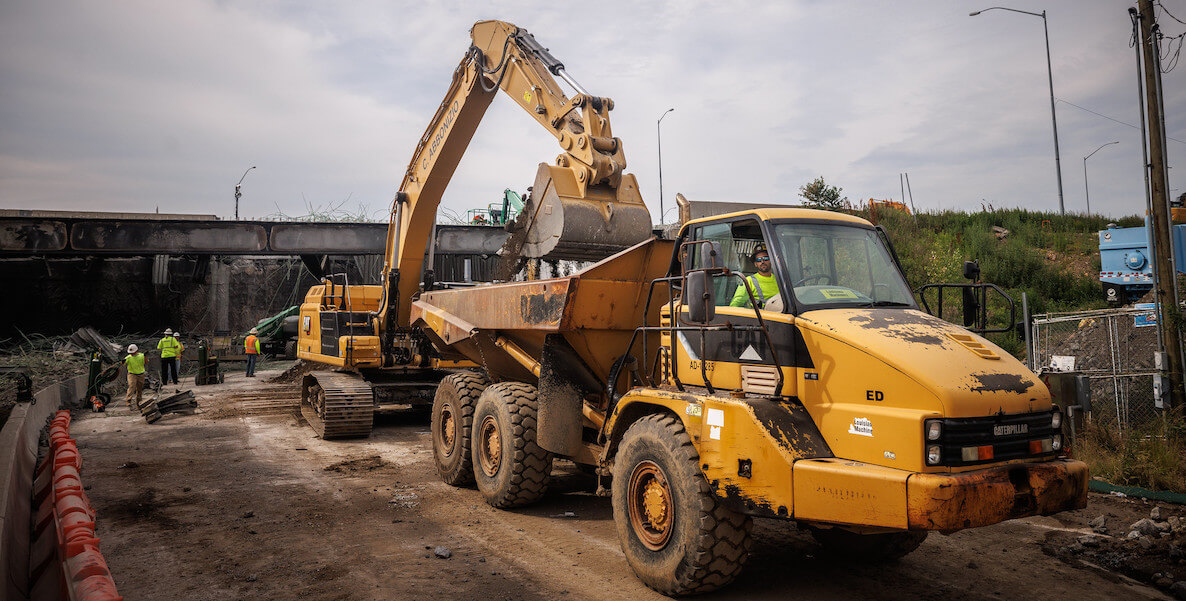I-95 cuts a 1,900-mile path through 15 states from Florida to Maine. Philadelphia’s stretch became national news on June 11 when a gasoline tanker crashed at the PA 73 interchange (aka Cottman) and caused a fire that collapsed northbound lanes.
Governor Josh Shapiro issued a disaster declaration, freed up federal funds for the repairs, flew over twice in helicopters (one time going viral), and just announced the affected sections of 95 will reopen … this weekend. Miracles do happen, even in Northeast Philly.
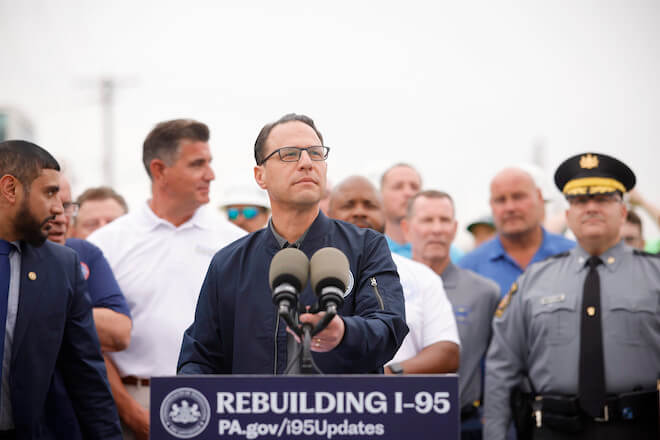
With the spotlight focused squarely on this disaster, it’s easy to forget that 1-95 has endured (and been the cause of) a cascade of disasters going back a half-century. Here, a look back at a few of the local calamities and urban blunders that make modern planners suggest we should just bury or demolish I-95 altogether.
I-95: a matter of … national defense?
First, we need to recognize: The Federal-Aid Highway Act, which paid for 90 percent of I-95’s construction passed in 1956. (Our portion, known as the Delaware Expressway, mostly went up constructed between 1959 and 1979.) Why is the year 1956 relevant? Because 1956 was during the Cold War, and the above Highway Act also went by the National Interstate and Defense Highway Act.
Most of those words make sense, but to quote Sesame Street: “One of these things is not like the other.”
Defense?
You got it. One motivating factor for the feds footing that 90 percent bill was “avoiding national destruction in a nuclear attack.”
Who cares if thousands of people get evicted and a collection of row houses and warehouses that represent 300 years of history get demolished? Kevin Bacon’s dad said we have to be nice to cars.
Wait, how?
By “dispersing existing large cities into smaller settlements.” In other words, highways would facilitate the survival of a population in the event of nuclear strikes by spreading said population to the wider suburbs.
This is important to know for Philadelphia. Even from the beginning, highways weren’t meant to make the lives of people living in the city better. The point of highways: Accommodate the growth of the suburbs and usher in a new era of automobile expansion. Those who couldn’t afford to flee the destructive burrowing of the interstate system (what Matt Ruben of the Central Delaware Advocacy Group calls a havoc-inducing “gash through the city”) were left to deal with the traffic and noise and air pollution wrought by the thing.
Cars as “honored guests”
Edmund Bacon, who, in 1968 became the executive director of the city’s Planning Commission, championed this car-centric mentality. (Fun fact: 10 years before his appointment, Bacon sired would-be Hollywood actor Kevin Bacon. So now you can Six Degrees of Kevin Bacon this article in, like, two steps.)
“We think it better not to fight with the automobile,” Bacon (the elder) publicly stated. “Rather we must treat it as an honored guest and cater to its needs.” This mindset would cause later historians to blame I-95 for the “continued downward spiral of public transportation, virtually guaranteeing future urban growth would perpetuate a centerless sprawl.”
That would be a centerless sprawl enabled by a three-block-wide gash that amputates the waterfront from the rest of the city. Who cares if thousands of people are evicted and a collection of row houses and warehouses that represent 300 years of history are demolished? Kevin Bacon’s dad said we have to be nice to cars.
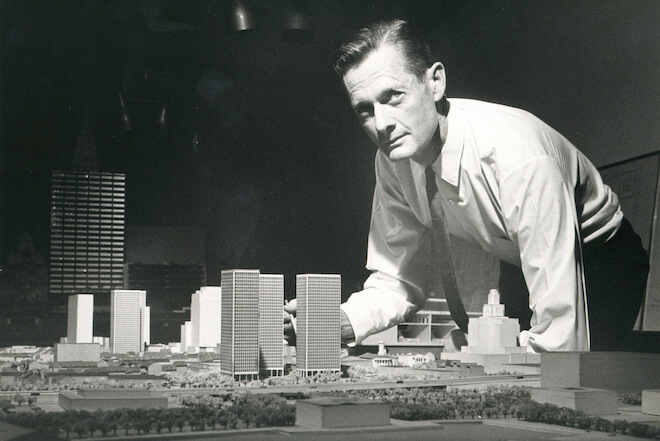
Slicing off the waterfront alone may seem like a particularly shortsighted move. Or to quote Ruben, “putting a highway next to the waterfront was so stupid.” Well, thanks, Democratic Party of 1951.
History buffs might recognize that year as the time Republicans in Philly — due to copious amounts of corruption — lost all political control. Under their unscrupulous watch, the ports and piers had fallen into complete disrepair. Democrats, campaigning on infrastructure reform, searched the city for cheap, unused swaths of land on which to build a highway to the future. Thanks to extreme mismanagement, the waterfront had become just such a land.
It’s not like everyone at the time was onboard with taking a machete to the Delaware Riverfront — least of all the dockworkers who would now have to cross a highway system just to get to work. In a blatant move of race and class bias, wealthier residents of Society Hill (and a more remembered contingent of folks then referred to as “hippies” repping South Street) strongly objected to I-95 cutting them off from the water. And because the former had political connections (Bacon had recreated Society Hill himself), highway officials agreed to a compromise. They’s sink and the interstate below grade and partially cap it.
As we know, I-95 is one of the most charming garden destinations in Philadelphia … a garden destination that occasionally catches fire.
But if you were Southwark — more or less today’s Queen Village — with a more racially diverse and poorer population, you could protest all you want (and they did) about waterfront views and, you know, losing homes — to no avail. Highway officials just responded, “The interstate will continue in a straight line from Maine to Florida, and won’t deviate for some old buildings.”
At the time, Bacon assured Philadelphians that I-95 would be a glorious benefit to us all. When John Milner, an architect working for the National Park Service in the 60s told Bacon that a highway would create a “strip of chain link fences and garbage all along the Delaware River,” Bacon replied, “Nonsense! It is going to be beautifully landscaped along the way!” As we know, I-95 is one of the most charming garden destinations in Philadelphia … a garden destination that occasionally catches fire.
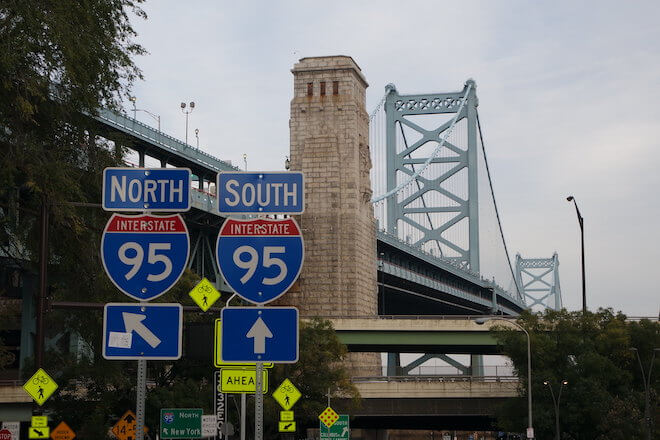
(To be fair, folks have worked hard — and spent millions — to turn Penn’s Landing, at least, into a destination worthy of backdropping Independence Blue Cross commercials. And, we can all hope that one day, a now-underway massive capping project will finally reconnect at least part of the city to a portion of the riverfront.)
We’ve seen this show before
This month’s explosion wasn’t even the first time I-95 went up in flames in the last couple decades. In 1996, the owners of a tire disposal site in Port Richmond conspired with two men to store 10,000 tires under I-95, light the mass on fire, and hope, like in the opening of The Simpsons, no one would care.
People absolutely did care, because the ensuing hellfire set the highway ablaze and melted it from below. A whole four-mile stretch shut down for eight days and for months afterward was operating at just half-capacity while Penndot worked on repairs.
Then there was the time only 15 years ago when a two-mile stretch of the interstate shut down over cracks (including brick-size chunks raining to the ground) in a concrete support in Port Richmond. That a potential collapse was averted was thanks to a random inspector who happened to be in the area and decided to make a spot check. “It was very fortuitous that he took a look that day,” said City officials. Uh, yeah, no shit fortuitous.
After the calamitous accident this month, maybe we could look out and see a future where the city finally decides to abandon its 60s-era focus on treating vehicles as honored guests. It’s a vision where we offer public transportation, walkability, green spaces and public health the better seat at the table. What would we do with I-95? As Inga Saffron at The Inquirer wrote in 2007, “Interstate-95 must change. Simple as that. Bury it. Narrow it. Put a deck over it. Just get it out of our sight.”
Even Bacon had a deathbed change of heart. Alanna Stewart writes in The Construction of Interstate-95: A Failure to Preserve a City’s History: “Ironically, later in his career, Bacon grew weary of automobiles and highways, and decided that bicycles were a much better method of transportation. Unfortunately, many of Philadelphia’s historic buildings had by then been demolished.”
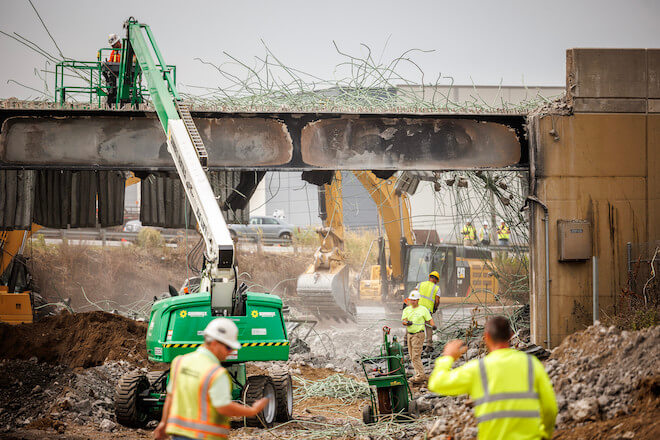
![]()
MORE ON THE I-95 COLLAPSE OF 2023



